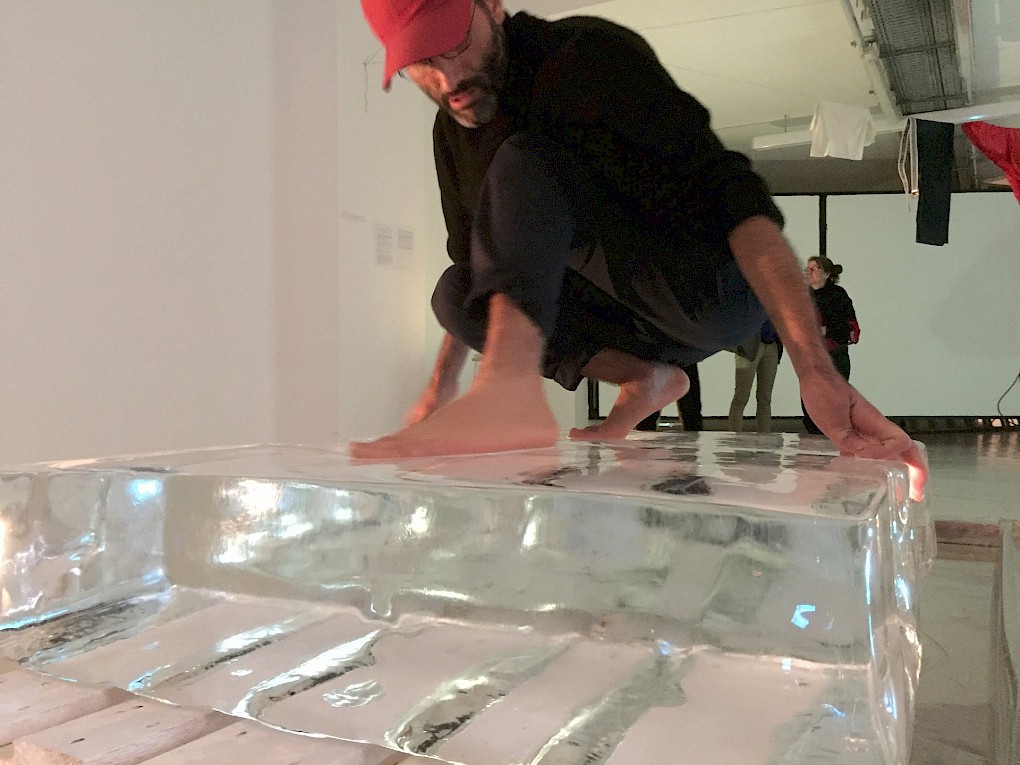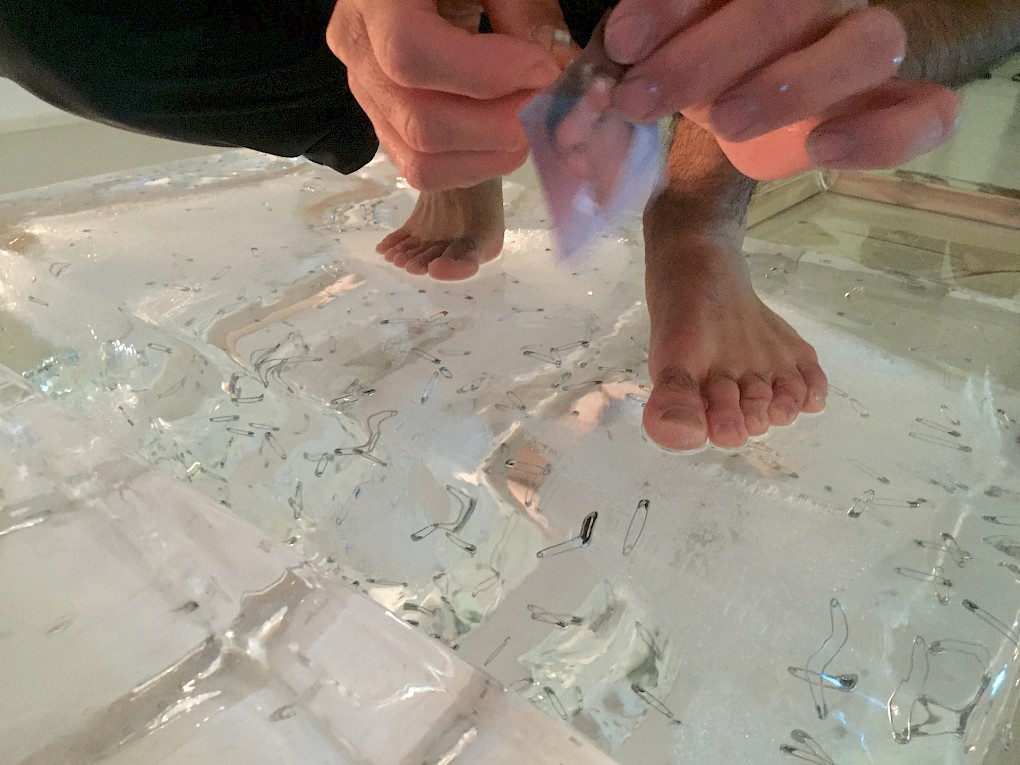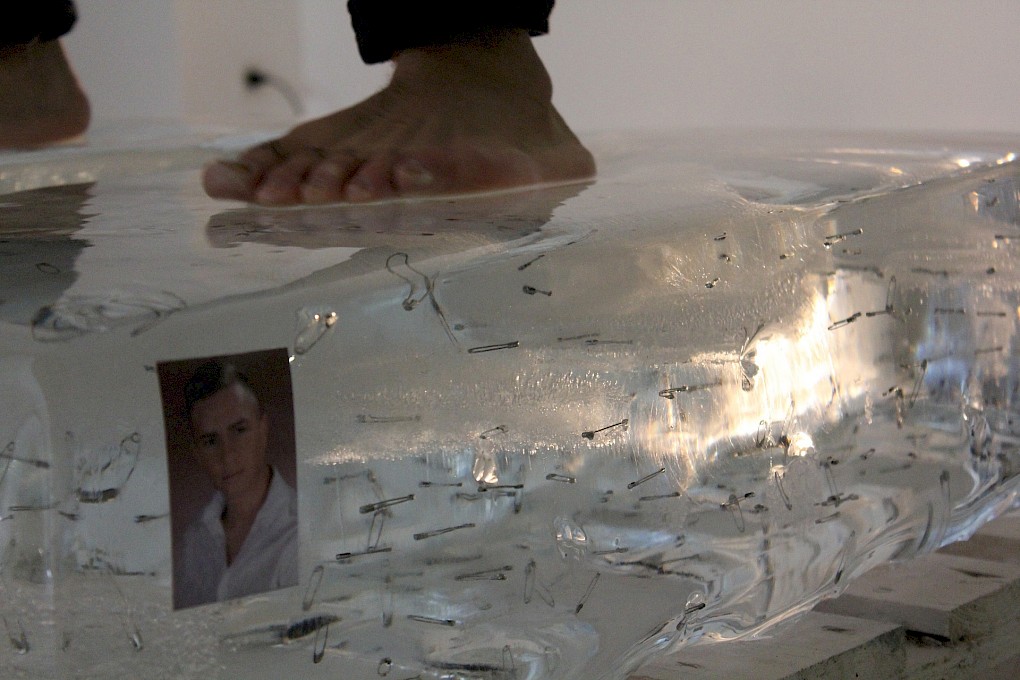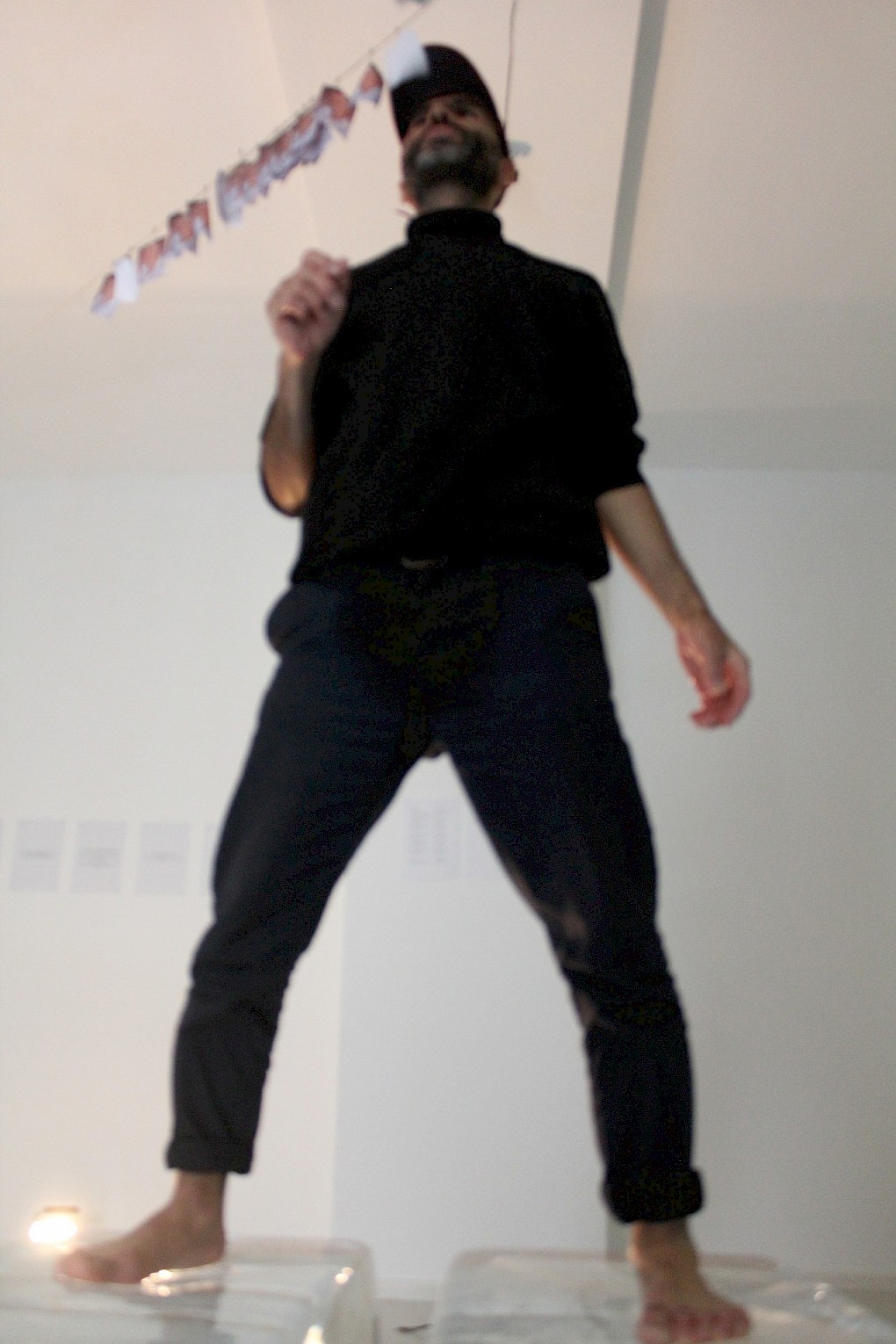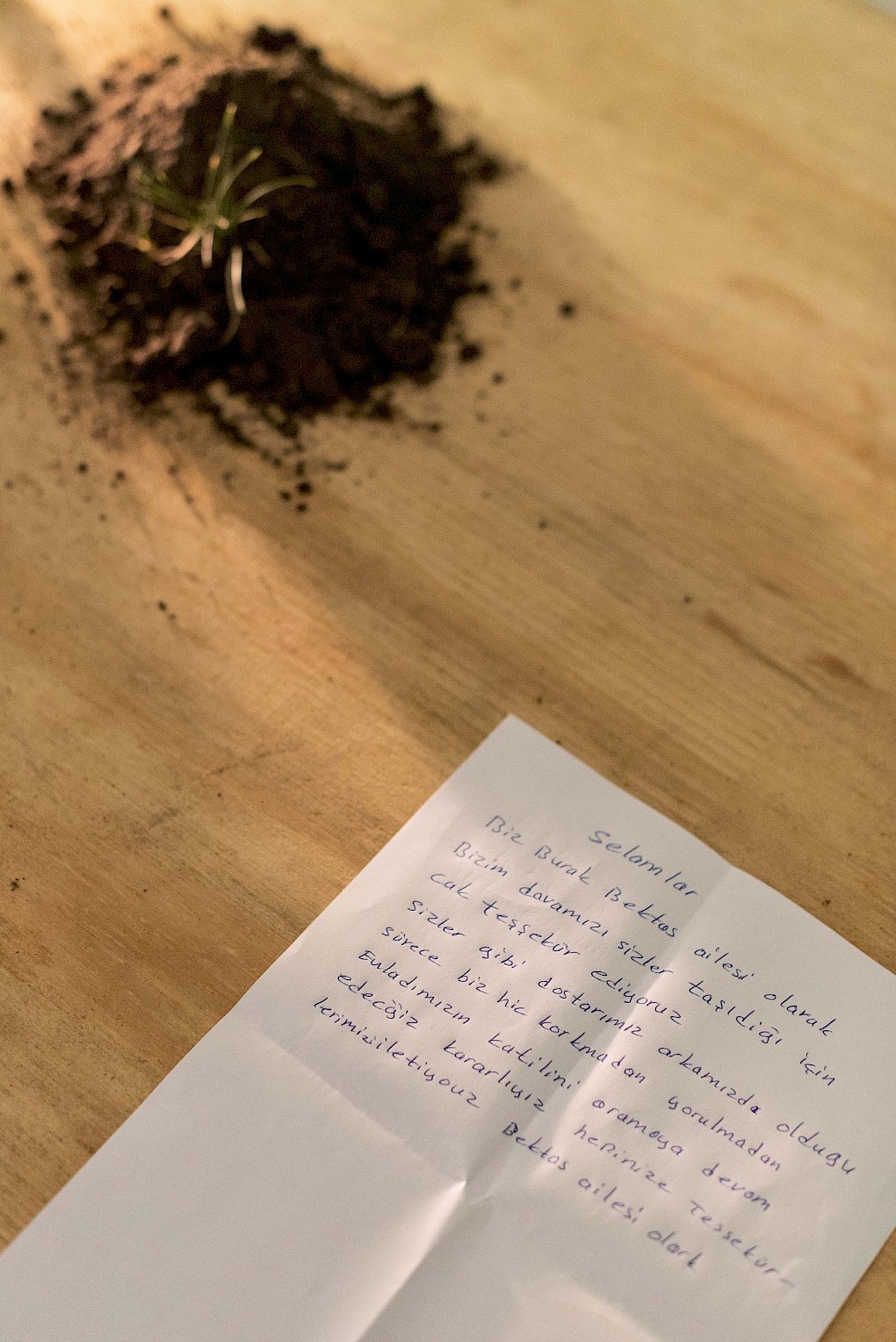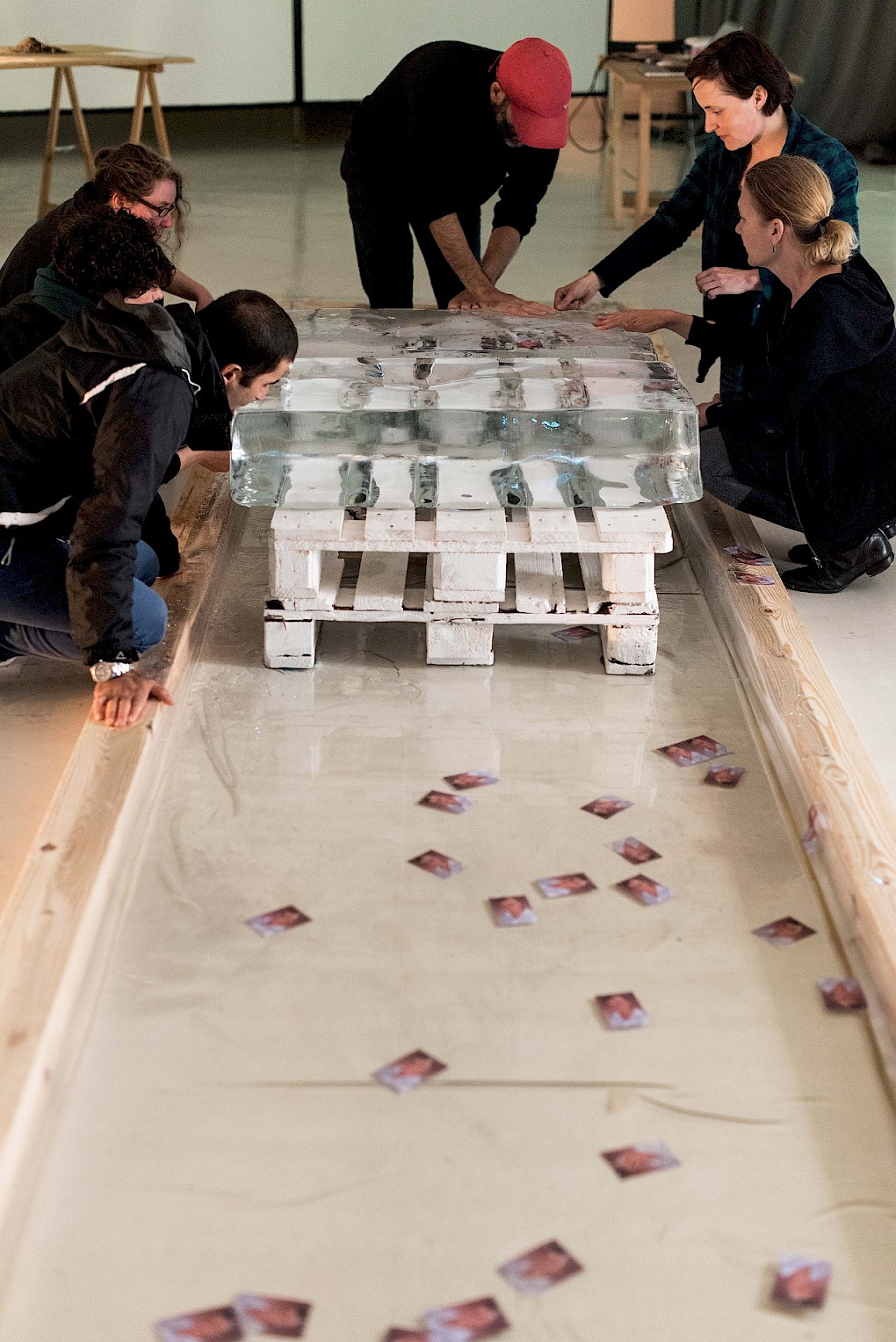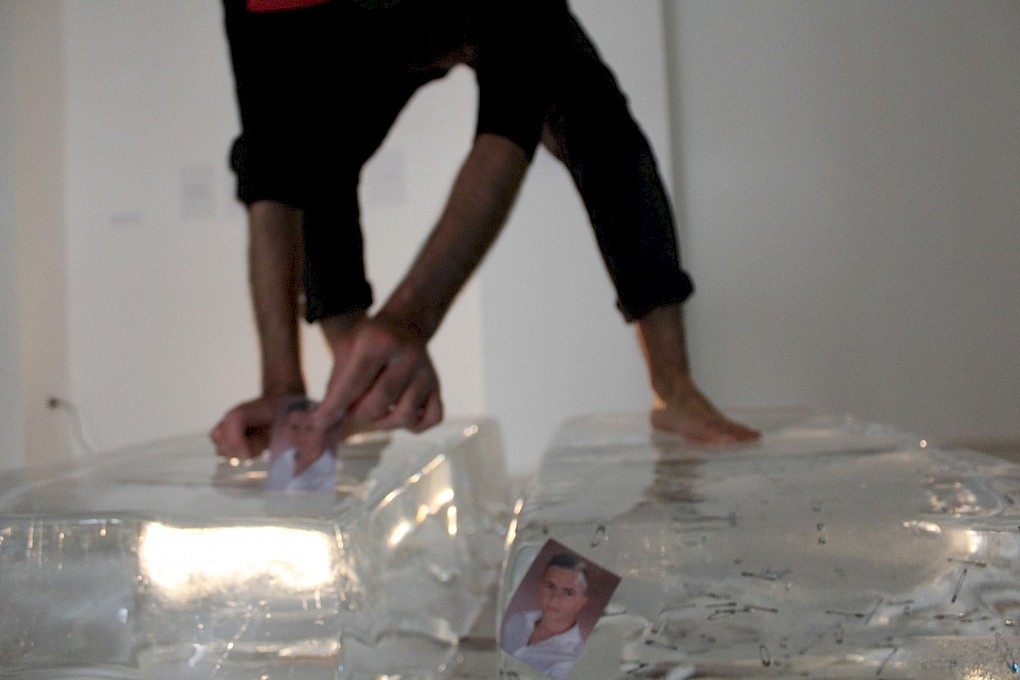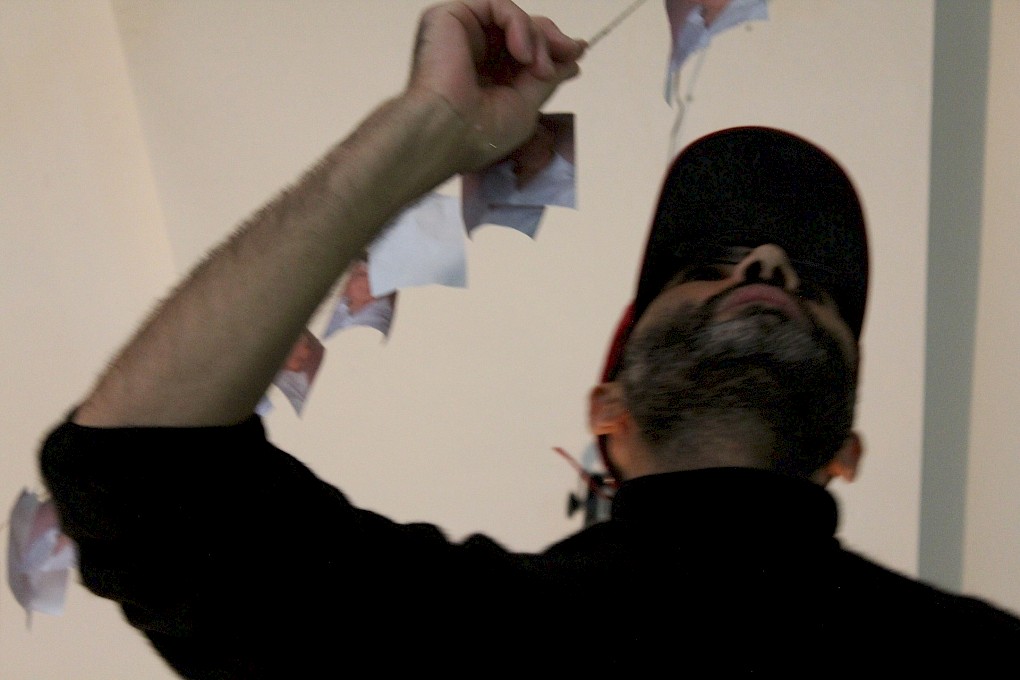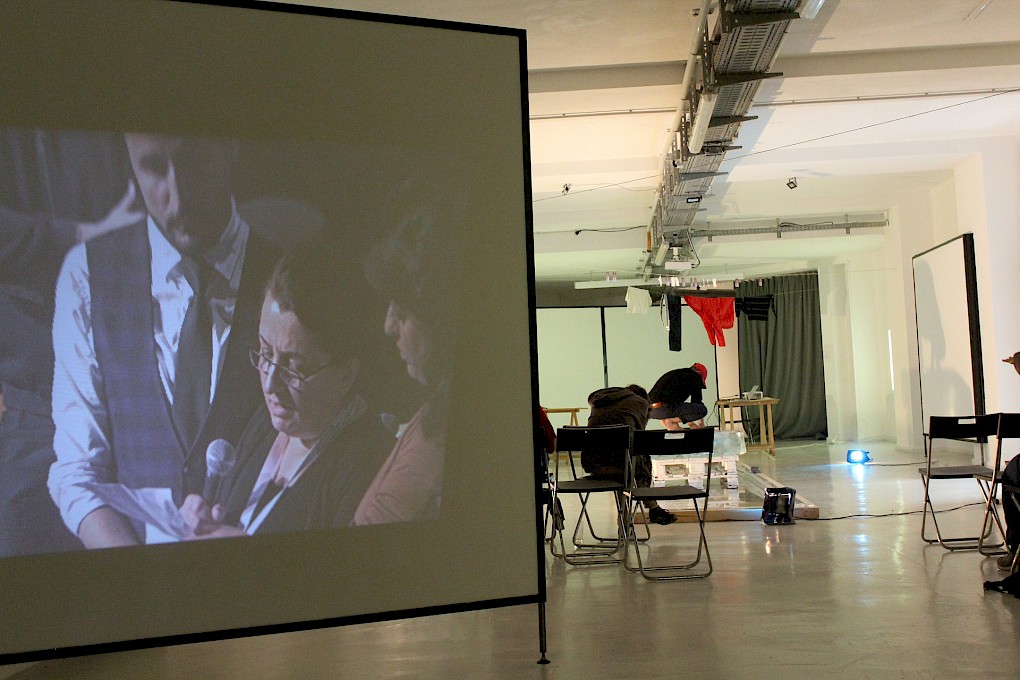Tribunal – A Matter of Emotion (No Echo In Front Of My Shout)
Cognitive Cultures #2 26.06.2018
10:00–18:00 Durational performance by Wahshi Kuhi
19:00 Panel discussion with Wahshi Kuhi, Bahar Eriçok, Iris Rajanayagam and Julia Stegmann, moderated by Nathalie Anguezomo Mba Bikoro
Curator Nathalie Anguezomo Mba Bikoro
fly birds fly to my birthplace
fly birds fly to my birthplace
fly birds fly there is no fidelity
there is neither watercourses nor a water like that
there is no echo in front of my shout
there is could soil in this fire place
fly birds fly to my birthplace
fly birds fly to my birthplace
There are so many victims, who know what became silent. We disappear the moment we remain silent. Letting go of the silence makes us live.
The impossibility of 'fellow feeling' is itself the confirmation of injury. The call of such pain, as a pain that cannot be shared through empathy, is a call not just for an attentive hearing, but for a different kind of inhabitance. It is a call for action, and a demand for collective politics, as a politics based not on the possibility that we might be reconciled, but on learning to live with the impossibility of reconciliation, or learning that we live with and beside each other, and yet we are not as one.
In 2012, Burak Bektas was violently murdered by a group of neo-nazis which triggered a chain of displacement in the community. His murder followed a series of similar cases across Germany, notably that of Luke Holland, Enver Šimšek, Habil Kiliç, Mehmet Turgut, and Michèle Kiesewetter. Notable organisations like The Peoples’ Tribunal, Ramazan Avci and Initiative 6. April have made significant shifts in the way victims are placed into protection and how they tackle national prejudices. Bektas’ murder is symbol to the current lives of many marginalised communities submitted to violence with no guarantee of protection from the law or justice towards their lost loved ones. The NSU trials that covered some of these cases were considered prepertuating victims’ testimonies. An artistic project by Forensic Architecture challenges these cases through counter-forensic investigations into the murder of Halit Yozgat in Kassel (2006) by using public court data to oppose the case’s verdict. In its presentation, included in documenta14 (2017), it created new evidence to oppose the final verdict and its limitations on the legitimacy of law and justice performed. The story of this case, as of many, points to where patriarchy, dark legacies of colonialism, and any sort of Othering ought to be dismissed. The police regressed and issued new evidence to the court not previously released to dismiss the hearing and close the case after the intervention of counter-forensics from the FA team creators. The project shows the paradox between science, technology and fiction and how its victims’fates were later revealed to be connected to a series of racially motivated murders carried out by the National Socialist Underground. The Forensic Architecture team was invited by the organization The People’s Tribunal “Unraveling the NSU Complex” to look into what could possibly be the collusion of a Western European state in violent crimes.
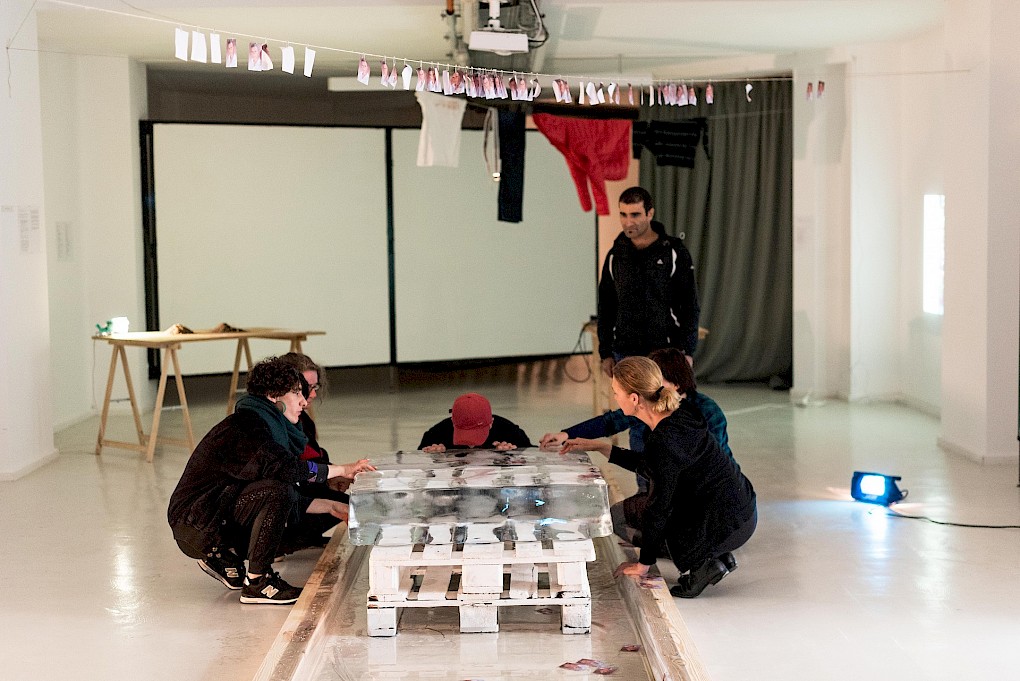
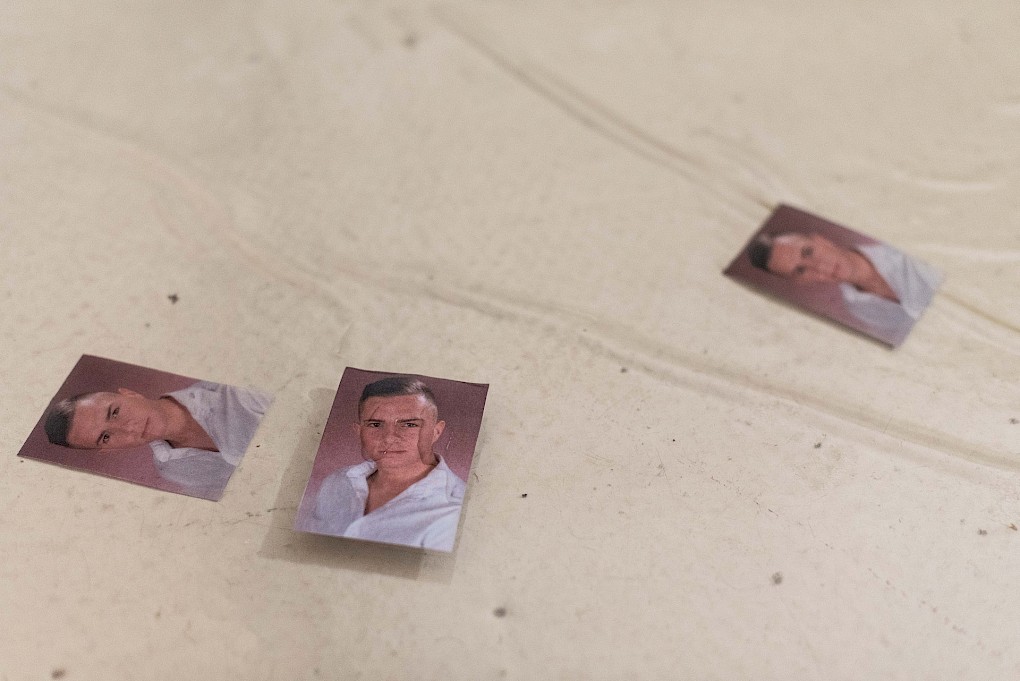
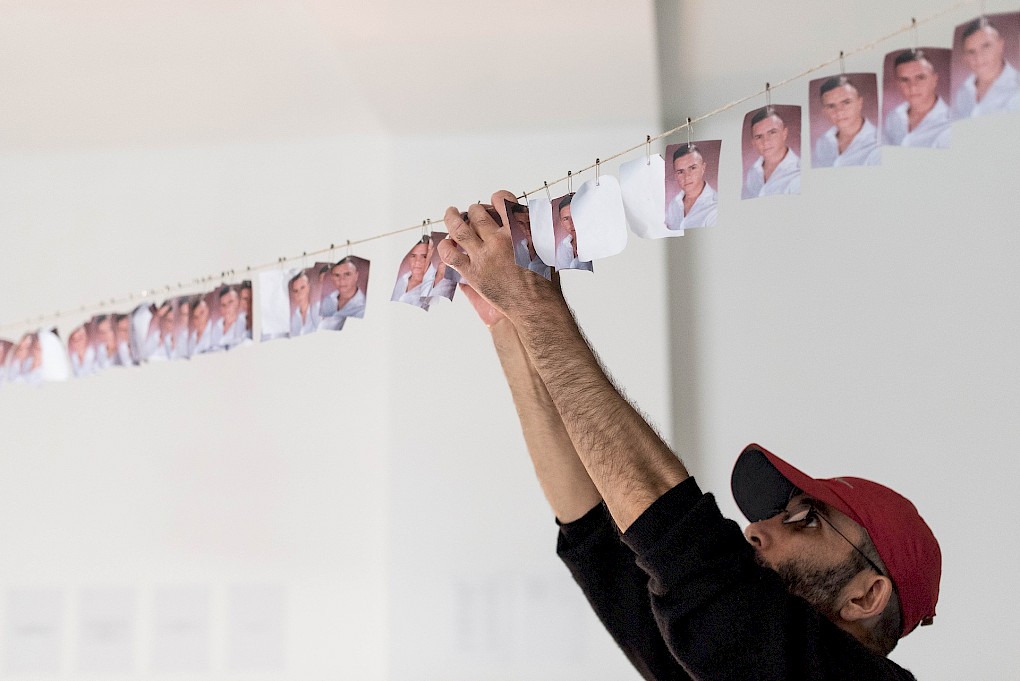
After 6 years of passive investigation into Burak’s murder, and in almost all of these cases of murders against migrants or mixed nationals, the Act of the Legal Protection Data published these cases as having not been reviewed or blocked from further investigation and remain unresolved. Often this poses questions on narratives of the eligitability of national law towards vulnerable communities under racially-motivated attacks, and the state’s position on re-inforcing narratives of oppression to silence a vocabulary of criminal investigation that is due to bring justice in court.
In the last 15 years, Wahshi’s refugee experience and exile from Kurdistan Iran and Iraq have led him to work towards change within the communities in Berlin affected by the fate of those brutally murdered. When the law is re-inforced by the state, when does the necessity of dismantling the myth of the ‚hunter’ enable the justice of the disappeared?
Wahshi investigates these paradoxes between science, law and testimony through a particular work dealing with colonial memory, migration, empathy, criminology and burial. Affectively for those victims, their silence is broken through rituals of language, rituals of burial. By paying a tribute to the family that he has for so many years followed, Wahshi displaces a superior court room into a burial ground that mimics the opening wardrobe of Burak’s childhood; a window into a history embedded in colonial debris and migrational routes. Perhaps this new formation of a peoples’ tribunal can show another possibility for art, one that can confront doubt and interrogate silence through aesthetics of emotion. In witnessing this story, what are the roles of the court, the police, the secret service, the media and the rest of our society?
Counter-forensics, civil society forensics, are about performing the truth in different forums
In the framework of Cognitive Cultures #2, Wahshi proposes Tribunal–A Matter of Emotion (No Echo In Front Of My Shout) as a collective court––to re-conjugate hierarchichal vocabularies of speech, body power, irrationality, law, stage and heritage. He proposes a work concerning safety and emotion by introducing a fictional narrative of the tribunal of the after-life within a labyrinth of a child’s memory wardrobe.
In this very intimate commemorative performance work, Wahshi accentuates on the complexities of neighborhood and its relationship to historical colonial memory that often pushes displacement, agression within a political framework that builds on the anxieties of gentrified spaces in public and private territories. The dismantling of the court room into a reparatory burial ground forms a resistance to the formidable allegory of national justice and the domination of state law overiding citizen protection. He believes that performance is the first law that entitles a process of mourning, visibility, expression as well as a form of taking care of the living. The law of the court is replaced by the law of the body/emotion.
Between the body of Burak and our own is an authority of resistance and refusal of emotion. This resistance is expanded in the expression of movements Wahshi emits as spoken word and transmission. If the traces of these vicitms have been ignored, Wahshi asks what becomes of the traces of their mothers?
Her traces to perform the inability to mourn tells of a continual injustice towards the evidence of the failures of legal investigations in a democratic state. She is suddenly denied of her own truth and ritual to mourn and denied a place in the tribune of the law. Wahshi hopes to create a memorial for the Mother(s) who have been denied this right to perform which underlines together with the artist’s exile and exclusion of performing in public space.
Wahshi highlights Germany’s at times inability of emitting cultural integration by critically reflecting on the history of colonial practice, forced migrations and war, reminding of those who are belonging to a place remain often a ‚Gastarbeiter’ to the state, opinions enforced through propositions of the rows concerning the constitutional referendum in Turkey and dual citizenships.
The risk of being a ‘soft spot’ for the nation, and for the national subject, is not only the risk of becoming feminine, but also of becoming ‘less white’, by allowing those who are recognised as racially other to penetrate the surface of the body. In this realm, emotionality as a claim about a subject or a collective is clearly dependent on relations of power which endow ‘others’ with meaning and value.
In the panel discussion after his durational performance, Wahshi Kuhi presents his artistic experience following Burak Bektas’ murder and the forums that were formed over 6 years. The panel aims at investigating racially-orientated crimes in Germany by developing different perspectives of enquiry with Julia Stegmann (SIS e.V.) on cultures of safety and tenderness in German film productions, Iris Rajanayagam (curator of Xart splitta) on politics of body and emotion and Bahar Eriçok (activist from Burak Association) on integration & memorial culture of art in public space. The panel is moderated by Anguezomo Mba Bikoro.
Born in Kurdistan Iran, Wahshi Kuhi is an activist and performance artist who considers himself as a „non-citizen“. With his body, Kuhi thematizes, state violence and military attack, right to mother tongue and is politically active in participating in human rights activities with marginal groups. His work investigates colonial ties with Kurdish culture and challenges his own personal history of prison and repression, migration in times of war and racial exclusion, the forced labour of guest-arbeiter and exotification of his body. Kuhi’s performance forms transmissions of body relationships, censorship, duration and sustainability to comment on oppression, visibility and patriarchy.
His creative practice caused a reaction in 2010 by the Iranian Revolutionary Guard which listed him as a dangerous person against National Security in Iran, and is waiting a death sentence. Exiled from his birthplace, he now lives and works in Berlin.
Wahshi’s works have been featured in Gallery Shanader Kurdistan, Iraq’s Arbil Academy of Fine Arts, Kave refugee camp in Erbil, Manchester’s Cornerhouse; BIFPA 17 Belfast International Festival of Performance Art; SKALA Gallery in Poznan Nomadic Arts Festival in Poland; MPA-B at Acud and OKK; SOMA Gallery, Gemäldergaleri Berlin.
Iris Rajanayagam is a historian (MA Modern/ Contemporary History at University of Cologne, Humboldt University of Berlin, University of Dar es Salaam). She works among others on postcolonial theories. Her focus is particularly on colonial continuity in German and European migration, refugee and asylum policies, intersectionality and racism and discrimination-critical theory and practice. She works as a program director at xart splitta e.V. and teaches and researches at the Alice Salomon Hochschule Berlin in the field of "Racism and Migration". Iris Rajanayagam is co-founder of Reboot.fm's Talking Feminisms radio program and has worked for The Caravan for the Rights of Refugees and Migrants for many years. From 2013 to 2016 she was part of the editorial team of the journal "Leben nach Migration" of the Migration Council Berlin.
Julia Stegmann is an activist in Burak Bektas Organisation. She will discuss the converging operations of art and politics in performance in the work of Wahshi Kuhi.
Bahar Eriçok is an activist in the Burak Bektas Organisation.
A collaboration of Universität der Künste Berlin––Institut für Kunst im Kontext, Interflugs, Initiative für die Aufklärung des Mordes an Burak Bektaš and SAVVY Contemporary
